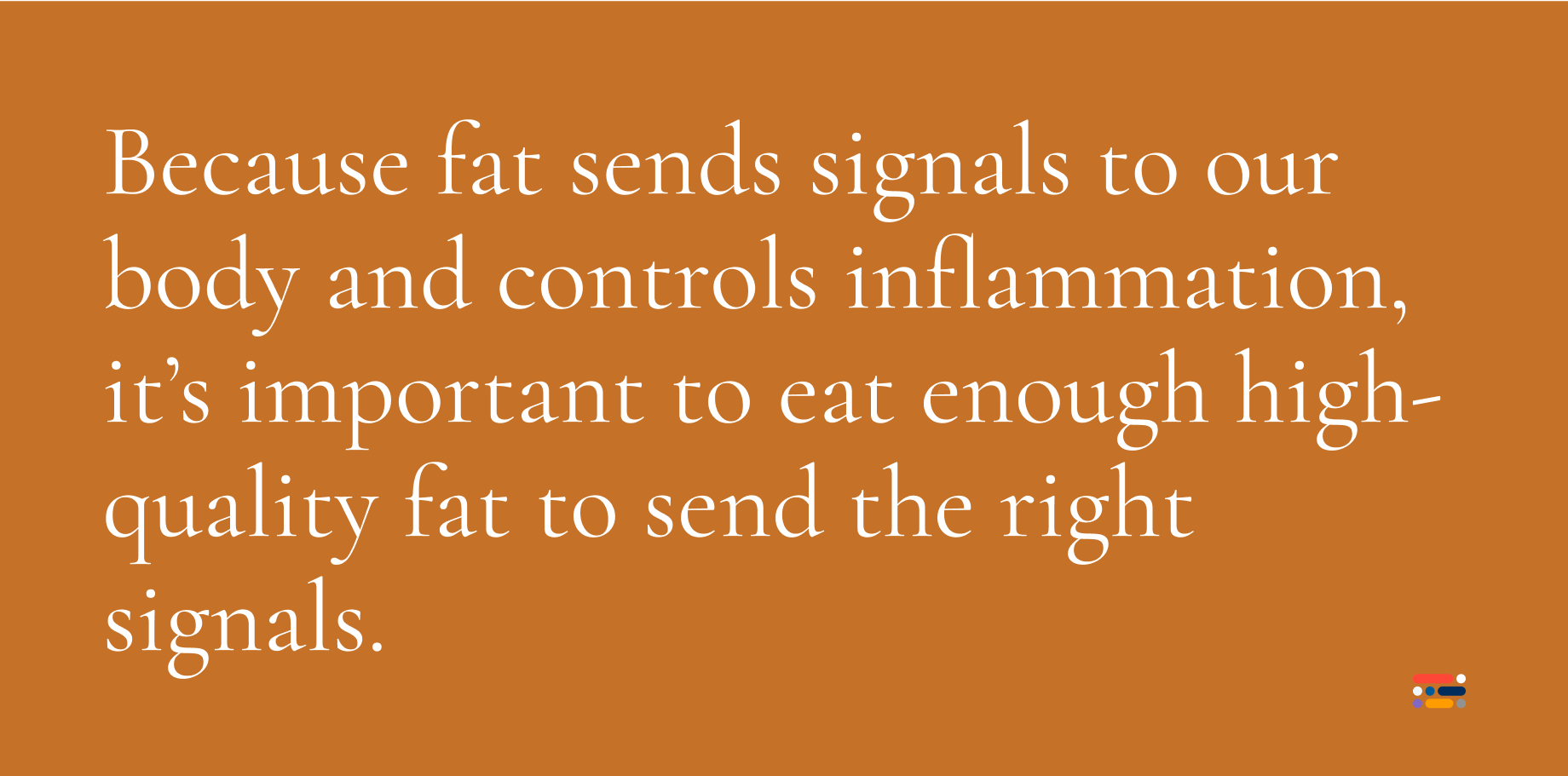We use cookies to enhance your browsing experience and analyze the performance of our website. By clicking Continue, you agree to the use of cookies. For more information, please see our Privacy Policy or update your Cookie Preferences.


Fat is a substance that is essential for life but is very misunderstood. Many people are focused on their fat rolls, rather than fat's role as a necessary biological substance - making fat the enemy. By the time you're done reading this article, you'll be convinced that it's one of the body's more important molecules. Read on for practical tips to keep a healthy fat profile.
When people think of fat and their body, they may think of the extra padding in unwanted places. This stored fat is also called adipose tissue. Adipose is important for warmth, cushioning vital organs, and as a depot for calories in food shortage. Adipose doesn't just sit there, it's actively creating hormones and inflammatory signals that communicate with the rest of the body. Too much adipose is not good, but a little is necessary.
Did you know that fat is also part of every single cell in your body? All 30 trillion cells have a membrane made of fat, called a lipid bilayer. The cell membrane is critical because it controls what enters and exits the cell.1 It also controls the inflammatory response. The foods we eat can influence the composition of fats in the cell membrane, so it's important to be mindful and eat healthy fats.
Your brain is nearly 60% fat. Essential fatty acids, like omega-3 fatty acids, are important for brain development. Fatty acids are also involved as messengers that can injure or protect the nervous system.2
You have fat circulating in your blood, which helps direct it to where it's needed in the body. If you've ever had your blood cholesterol tested, then your doctor ordered a lipid panel. The cholesterol circulating in the blood can be deposited into arteries. Too much cholesterol buildup in the arteries is called atherosclerosis which can lead to high blood pressure and heart disease.
Fat is also necessary in our meals to help absorb fat-soluble vitamins like vitamins A, D, E, and K. Our sex hormones are made from cholesterol including progesterone, estrogen, testosterone, and DHEA, as well as our stress hormone cortisol.
In the past, there was a misconception that eating more calories fat leads to weight gain, which popularized low-fat diets. However, Dr. Mark Hyman, a leading functional medicine doctor, explains that fat itself doesn't make you fat. Many people today have successfully lost weight on high-fat ketogenic diets, debunking that myth.
The truth is, consuming excess carbs and sugars can lead to weight gain, as unused carbs are stored in the body as fat. However, fat quality matters more than quantity. High-quality fats send positive signals to the body and help control inflammation, while poor-quality fats can contribute to low-grade inflammation, altering metabolism and increasing the risk of obesity and diabetes.3

A standard lipid profile measures blood lipids, like cholesterol and triglycerides, which are linked to heart disease. High cholesterol is a common problem in people who consume a Standard American Diet full of low-quality processed foods.
Fatty acid testing examines the composition of fatty acids from our diet. This nutritional test shows the composition and balance of inflammatory and anti-inflammatory fats in the body. Imbalances in fatty acids are connected to a wide range of conditions, including heart disease, 4 autoimmune diseases,5 cognitive decline, 6 mood disorders,7 cancer,8 inflammatory bowel disease,9 diabetes,10 psoriasis,11 asthma,12 and many others.
Eat more foods like cold water fatty fish (wild-caught salmon, herring, sardines), avocadoes, nuts, seeds, olives, and olive oil. There is much debate on saturated animal fat from meat and dairy as being unhealthy. According to Dr. David Ludwig, a Harvard professor, researcher, and endocrinologist, full-fat dairy benefits outweigh reduced fat dairy. If you do consume animal fats, consider meat, eggs, butter, and cheese that are organic. Anti-inflammatory omega-3's were found to be higher in organic, pastured meat compared to conventional meat.13
Avoid fried food, fast food, trans fat, and hydrogenated oils. There are polarizing opinions on seed oils like canola oil and whether they are healthy or not. In general, getting your fat from a whole food source (the food itself versus the oil) may provide the most benefit. Fats and oils cooked at high temperatures that starts smoking should be discarded because it has become oxidized and is highly toxic to your body.
A Fatty Acids Test shows your unique composition of 23 fatty acids along with cardiovascular risk ratios. Fatty acid testing results show imbalances that can be fixed with diet and/or supplements. The fatty acids test can also be ordered as part of a Comprehensive Nutritional Test - the Metabolomix+.
So how are you feeling about fat? Fat is a multifaceted and essential component of our bodies, often misconceived as solely a source of weight gain. Understanding its diverse roles, from cell structure to hormone regulation, is key to appreciating its significance. Embracing healthy fats like those from fish and avocados, while steering clear of unhealthy sources, can positively impact our health. Testing for fatty acid composition may further guide dietary choices. By reevaluating our perception of fat and making informed decisions, we can cultivate a healthier relationship with this vital nutrient.
If you'd like to learn more about the fatty acid profile, check out The Omega-3 Fatty Acids episode of The Lab Report podcast.
This article is meant for educational purposes only and is not meant to be misconstrued as medical diagnosis or treatment advice.